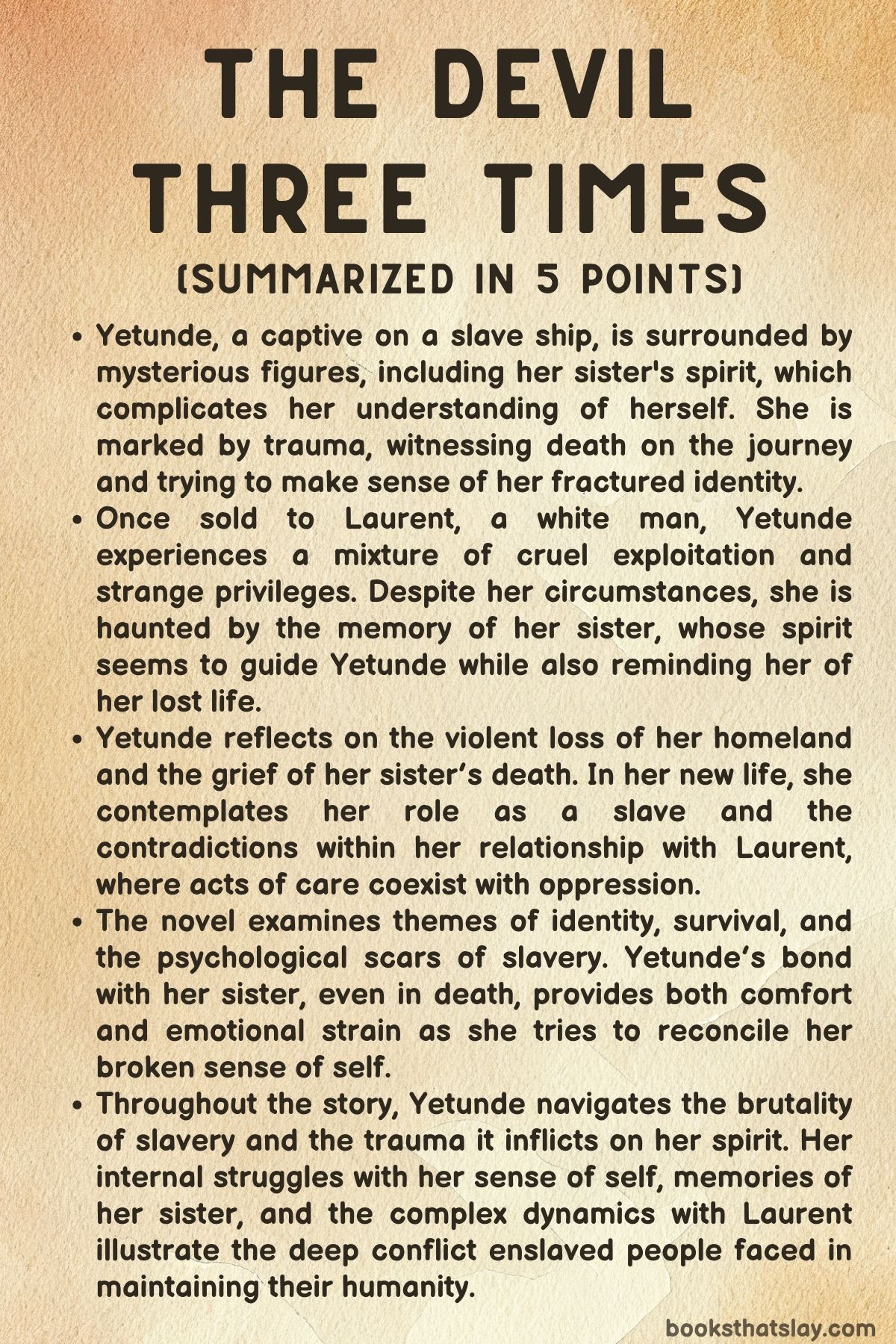The Devil Three Times Summary, Characters and Themes
The Devil Three Times by Rickey Fayne is a haunting and poignant exploration of identity, loss, survival, and the complexities of enslavement. Set during the transatlantic slave trade, the novel follows Yetunde, a woman who is imprisoned on a slave ship, torn between memories of her past and the brutal present of her captivity.
As she navigates the horrors of slavery and her fractured sense of self, Yetunde’s internal dialogue with the spirit of her sister offers a glimpse into her unbreakable bond to her heritage. Through this intimate portrayal of Yetunde’s journey, The Devil Three Times explores the harrowing effects of enslavement and the enduring strength of the human spirit.
Summary
The story begins with Yetunde, a woman trapped aboard a slave ship, where she is shackled alongside other captives. Amidst the suffering, Yetunde experiences confusion about her identity, questioning her reality and the world around her.
She is haunted by the mysterious laughter of a man on the ship, as well as the presence of a woman who claims to be her sister. This connection to her sister is cryptic, and their relationship hints at something more profound than familial bonds—perhaps a connection to Yetunde’s lost culture and identity.
Yetunde’s reflection on her life before the ship, her village, and the pain of losing her sister is central to her emotional turmoil. The ship’s journey across a vast sea is filled with death, suffering, and the degradation of her fellow captives.
The trauma of the voyage leaves Yetunde marked, both physically and mentally, as she bears a scar on her head—a symbol of her transformation and the violence she has endured.
Upon arrival in a new land, Yetunde is bought by a man named Laurent, an “ofay” (a derogatory term used for white men). While Laurent is a cruel and exploitative slave master, Yetunde receives certain privileges not afforded to other enslaved people.
She is not shackled, and Laurent provides her with care, including food and basic comforts. Despite this, she remains a captive, trapped in the brutal system of slavery.
Yetunde’s internal struggle intensifies as she grapples with her identity and the strange, lingering presence of her deceased sister, who continues to guide her thoughts and actions. The presence of her sister within Yetunde’s mind symbolizes her connection to her roots, but also serves as a constant reminder of the separation from her past life and culture.
In her new life with Laurent, Yetunde is forced to come to terms with the ongoing trauma of her past. She reflects on her life before the ship—the loss of her village, her family, and the violent history of her homeland.
These memories are interwoven with her present, as Yetunde is constantly reminded of the horrors of enslavement. Laurent’s peculiar kindness toward her, such as providing food and medical care, does not erase the fact that she remains a slave, subject to his whims and control.
Yetunde’s relationship with Laurent is complex, as she feels both a deep sense of revulsion and an uncomfortable dependence on him for survival.
Yetunde’s interactions with other enslaved people also play a crucial role in her emotional and psychological state. Though she is often isolated and caught in a strange duality of being cared for yet controlled, Yetunde finds solace in her ongoing connection with her sister’s spirit.
Her sister’s spirit represents both a source of comfort and a constant emotional strain. The pain of loss and the desire for freedom are ever-present in Yetunde’s thoughts.
Her internal dialogue with her sister, whose presence within her mind refuses to dissipate, is a manifestation of Yetunde’s search for identity in a world that has stripped her of everything familiar. This bond with her sister is an emotional anchor that helps Yetunde survive the psychological toll of slavery, though it also complicates her understanding of her sense of self.
As Yetunde navigates the horrors of captivity, she is forced to confront the violent realities of the world she now inhabits. She reflects on the historical traumas of enslavement, including the loss of her community and culture, and struggles to maintain a sense of herself amidst the oppressive forces that seek to define her existence.
Yetunde’s struggle to reconcile her past with her present is a central theme of the narrative, as she moves through various phases of internal conflict, survival, and grief.
Yetunde’s evolving relationship with Laurent remains a key element of the story. Though she is given privileges by him, they do not erase the fact that she remains a piece of property to be controlled.
Yetunde’s emotional and psychological journey is marked by her deepening sense of disillusionment with Laurent’s kindness, as she realizes that even his best intentions cannot change the fact that she is still a slave. Her relationship with Laurent is fraught with tension, as Yetunde feels the weight of her exploitation and is reminded of her lack of agency and autonomy.
The ongoing presence of her sister’s spirit also influences Yetunde’s relationship with the other enslaved individuals around her. Though she is disconnected from her family and past life, Yetunde’s sister’s ghost offers a sense of connection to something greater than the brutal circumstances of her enslavement.
The spiritual bond between the two women serves as a reminder of Yetunde’s humanity, even as the physical and emotional scars of slavery attempt to strip her of it.
Yetunde’s life on the plantation is marked by the tension between survival and the quest for freedom. She is caught in the brutal cycle of enslavement, yet she holds onto the memory of her lost culture and family as a source of resistance to the dehumanizing forces around her.
Throughout the novel, Yetunde’s journey becomes a symbol of the enduring strength of the human spirit amidst oppression, as she struggles to maintain her identity in a world determined to erase it.
As the narrative unfolds, Yetunde’s inner turmoil becomes increasingly difficult to manage, as she is forced to navigate the complexities of identity, loss, and survival. The presence of her sister’s spirit remains a powerful influence on her thoughts, reminding her of the bond that transcends death.
Yetunde’s emotional and psychological journey is one of resilience, as she fights to hold onto the essence of who she is despite the brutal world that surrounds her. The story concludes on a note of reflection, as Yetunde contemplates the fractured nature of her identity and the lasting impact of enslavement on her life.
The Devil Three Times ultimately underscores the multifaceted nature of captivity and the unbreakable spirit of survival in the face of unimaginable trauma.

Characters
Yetunde
Yetunde, the central character of The Devil Three Times, is a complex figure whose internal conflict and evolving sense of identity form the backbone of the narrative. From the outset, Yetunde is imprisoned on a slave ship, shackled and surrounded by figures that blur the line between reality and fantasy, including her deceased sister, whose presence is both comforting and haunting.
Yetunde’s trauma is compounded by the loss of her village, her sister’s death, and the brutal reality of enslavement. As she is transported to a new land, Yetunde grapples with her sense of self, constantly questioning who she is in the wake of these traumatic events.
Her relationship with Laurent, the white man who buys her, is marked by a strange mixture of privilege and exploitation. Despite being given privileges denied to other enslaved individuals, Yetunde’s position as a captive remains unshakable, and her emotional turmoil intensifies.
Throughout the novel, Yetunde’s internal dialogue with her sister’s spirit reveals the depth of her emotional scars and the ongoing struggle to retain her humanity. The presence of her sister within her symbolizes a connection to the past and culture, though it is also a constant reminder of what has been lost.
Yetunde’s journey is not only about survival but also about reconciling the fractured parts of her identity and finding a way to move forward amidst the horrors of slavery.
Cassandra Ross
Cassandra Ross, a key figure in the emotional and spiritual narrative of The Devil Three Times, is a woman deeply burdened by her past and the unresolved feelings that linger from her relationships. Cassandra’s life is marked by unfulfilled desires, complicated familial dynamics, and the trauma of loss.
Her relationship with her half-cousin Porter Bland is both passionate and destructive, rooted in a shared history of personal and spiritual struggle. The bond between Cassandra and Porter is portrayed as deeply intimate yet fraught with emotional and moral complications.
Porter’s love for Cassandra is conflicted by the pressure from his family, particularly his grandmother, and by the societal constraints that limit his choices. Cassandra’s presence, both physical and spiritual, shapes the course of Porter’s life, as he reflects on their relationship and his own moral and spiritual disconnect.
The tension between Cassandra’s desires and the expectations placed upon her reflects broader themes of love, guilt, and identity. Her ghost-like presence in Porter’s life serves as a constant reminder of the complicated legacy of their bond and the inescapable pull of their shared history.
Porter Bland
Porter Bland is a troubled yet charismatic character whose emotional journey is closely tied to his relationship with Cassandra Ross. Porter’s internal conflict revolves around his love for Cassandra, which is complicated by the moral and spiritual teachings of his family and the societal expectations placed upon him.
His relationship with Cassandra is passionate, yet it is also destructive, as it exposes the deep emotional scars of both characters. Porter’s struggle with guilt, particularly in relation to his family’s expectations and the disapproval of his grandmother, shapes much of his emotional turmoil.
As Porter grows closer to Cassandra, he becomes increasingly aware of the complexity of their bond, which is not only driven by desire but also by a shared history of familial dysfunction. Porter’s character arc is defined by his struggle to reconcile his love for Cassandra with the pressures of family loyalty and societal norms.
His eventual realization of the intricacies of his own identity and the emotional cost of his relationship with Cassandra underscores the themes of love, loss, and the search for meaning in a world filled with moral and emotional complexities.
James Laurent
James Laurent offers a contrasting perspective to Porter in The Devil Three Times, providing a more grounded and stable figure in the midst of family turmoil. James’s role in the story is significant, as he navigates the complexities of family loyalty, guilt, and responsibility.
His relationship with his father, Robert Laurent, and his own experiences with love and family provide a stabilizing influence amidst the chaotic emotions and moral dilemmas that define the lives of his relatives. James’s bond with his wife, Twyla, and his children stands in stark contrast to the destructive relationships that plague his family.
However, James is not immune to the unresolved issues surrounding his half-sister Cassandra’s death, and his internal struggle with family loyalty and personal responsibility complicates his own emotional journey. James’s character is defined by his attempts to maintain a sense of balance and stability in the face of familial dysfunction, all while grappling with the legacy of guilt and love that binds him to his past.
His role in the story highlights the tension between family duty and personal desires, as well as the challenges of navigating a complex web of emotions within the confines of family and societal expectations.
Twyla Laurent
Twyla Laurent, while not the central character, plays an important role in the emotional dynamics of The Devil Three Times, particularly in relation to her interactions with Mary Laurent and the complicated family history. Twyla is a figure caught between love, loyalty, and guilt, as she wrestles with her past relationships, particularly with James Laurent and her brother.
Twyla’s role in the narrative is largely defined by the unresolved tensions that surround her relationships with those closest to her, including her role in the life of her half-sister Cassandra. Twyla’s influence on Mary is profound, and their relationship forms a central aspect of the story’s exploration of love, loss, and the quest for redemption.
Twyla’s internal struggles with her identity and the complex emotions that arise from her family’s history shape much of her narrative arc. Her presence, though often in the background, serves as a catalyst for the emotional growth and self-realization of the characters around her, especially Mary Laurent.
Twyla’s story, marked by longing and regret, reflects the broader themes of family, legacy, and the emotional weight of unresolved pasts.
Themes
Identity and Self-Discovery
The concept of identity is central to The Devil Three Times, with Yetunde’s struggle to understand her sense of self being depicted as a profound internal battle shaped by her traumatic experiences. From the moment she is captured and transported across the sea, Yetunde is forced to confront not only her external circumstances but also the disintegration of her identity.
Her captivity on the slave ship serves as a powerful metaphor for the loss of self that is a direct result of slavery. This loss is made even more poignant by her complicated relationship with her sister’s spirit, which lingers within her, trying to guide her but also acting as a constant reminder of what has been torn away.
The lack of autonomy and forced separation from her past leads Yetunde to question not only her identity but also her worth, given that her existence is dictated by the whims of her captors and the oppressive social structure of the time. Even as she moves through different environments, from the ship to Laurent’s household, she is left trying to piece together who she is in a world that constantly challenges her understanding of herself.
Her fractured sense of self, coupled with the psychological toll of her enslavement, presents a portrait of a woman caught between the remnants of her heritage and the trauma that continually shapes her perception of who she might be. The theme of identity in the novel thus serves as a reflection of the broader condition of enslaved people whose lives are stripped of autonomy and self-definition, both physically and emotionally.
The Legacy of Trauma and Loss
The trauma of enslavement haunts Yetunde throughout The Devil Three Times, manifesting not only in her memories but also in her ongoing emotional and psychological struggles. The death of her village, the loss of her sister, and the violent dismantling of her home are all markers of a profound loss that extends beyond the physical realm into the spiritual and emotional.
Yetunde’s internal dialogue with her deceased sister, whose spirit is woven into her consciousness, speaks volumes about the emotional burden she carries. This theme of loss extends beyond personal tragedy to the collective loss suffered by her people, symbolizing the disintegration of entire cultures and histories due to the violence of the transatlantic slave trade.
The novel underscores the idea that trauma, especially in the context of enslavement, is not just a personal affliction but also a communal and generational one. The emotional scars left by the brutal system of slavery are passed down, continuously reshaping the identities of those who endure its horrors.
Even as Yetunde attempts to navigate her new life under Laurent’s ownership, she is forced to reckon with the ever-present ghost of her sister and the specter of all that has been lost. This theme of loss and trauma reflects the unhealed wounds of history, where personal suffering becomes inextricable from a larger cultural and historical trauma that endures through time.
Power and Control
In The Devil Three Times, the dynamics of power and control play a critical role in the relationships between the enslaved and their masters, particularly in the interaction between Yetunde and Laurent. Laurent’s treatment of Yetunde is complex, as he exercises power over her in both overt and subtle ways.
While he shows some degree of kindness and privileges Yetunde with more freedoms than other slaves, his acts of care are ultimately a reminder of his ownership and dominance. Yetunde’s conflicting emotions toward him—ranging from dependence to resentment—reflect the ways in which enslaved people could be both objectified and manipulated through a combination of cruelty and false benevolence.
Laurent’s actions expose the ways in which slavery operates on both a physical and psychological level, with control being maintained not just through force, but also through the manipulation of emotions and relationships. Yetunde’s sense of self is continually challenged by this power dynamic, and her internal struggles reflect the broader experience of enslaved individuals whose relationships with their masters were often marked by this complex intersection of oppression and dependency.
This theme of power is also mirrored in the relationship between Yetunde and her sister, where the spirit of her deceased sibling offers a form of resistance to the control imposed on Yetunde. Even in death, Yetunde’s sister maintains an influence, representing a form of autonomy and power that transcends physical domination.
This tension between domination and resistance underscores the novel’s exploration of how power operates within the systems of enslavement, deeply affecting both the enslaved and the enslavers.
Survival and Resilience
Despite the overwhelming forces of oppression, The Devil Three Times is ultimately a narrative of survival and resilience. Yetunde’s journey is one of endurance, not just physically but emotionally and mentally, as she strives to retain her humanity amid the brutalizing effects of slavery.
Her interactions with her sister’s spirit provide her with the strength to continue in the face of immense hardship, even as her sense of self is continually fragmented. The theme of resilience is highlighted by Yetunde’s ability to survive not only the physical dehumanization of slavery but also the psychological warfare that seeks to erase her identity.
The choices Yetunde makes, from her relationship with Laurent to her moments of introspection, reveal her constant negotiation with her own sense of agency. She is a survivor, continually wrestling with the trauma of her past while navigating the constraints of her present reality.
Her survival is not just a physical act but a spiritual and emotional one, as she finds ways to hold onto the memory of her lost life and heritage. The novel suggests that resilience is found in the preservation of memory, in the refusal to completely succumb to the dehumanizing forces of the world around her.
Yetunde’s story is, therefore, a testament to the enduring strength of the human spirit, even in the face of profound injustice and cruelty.


